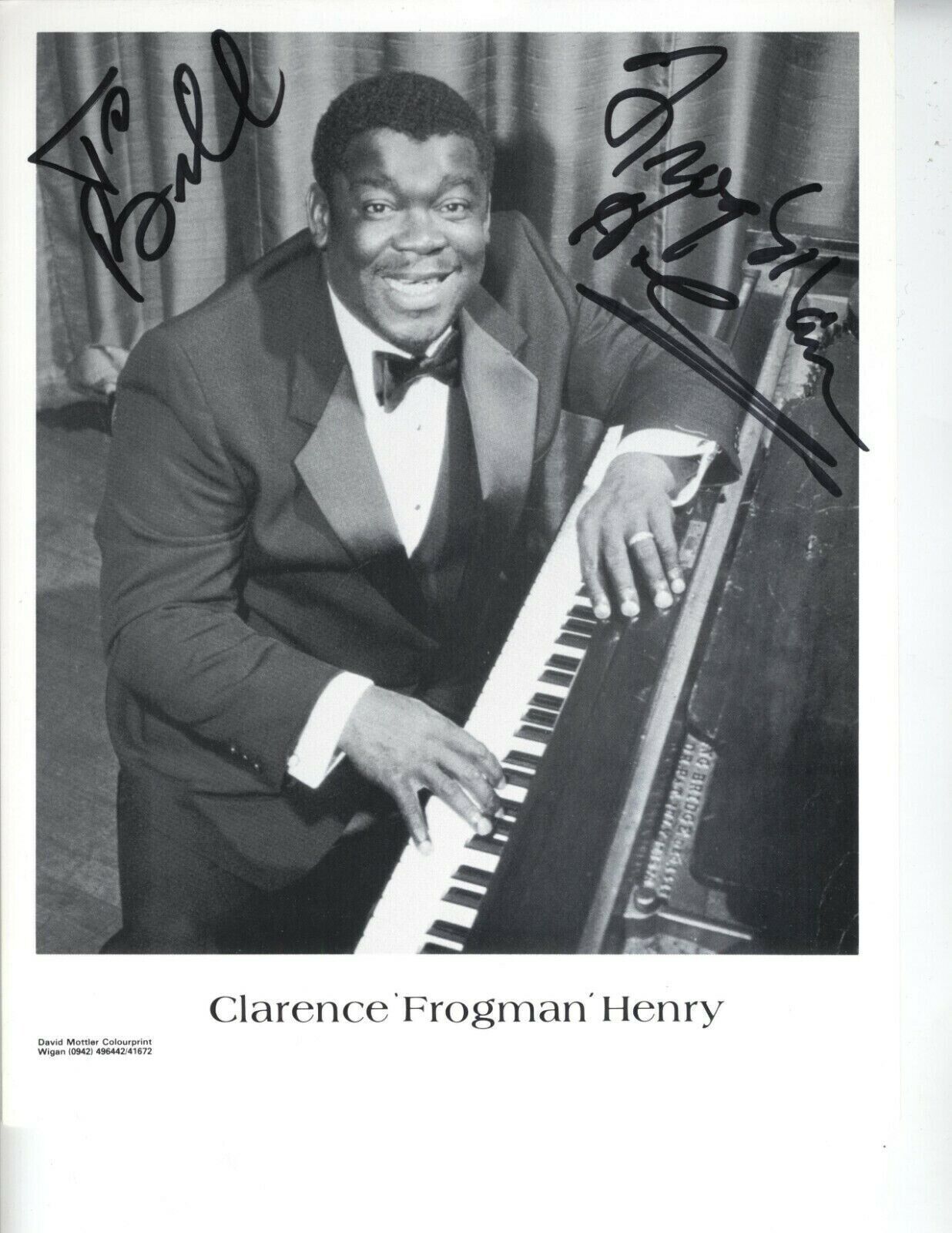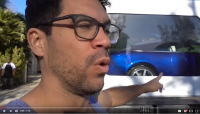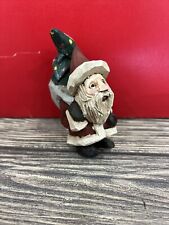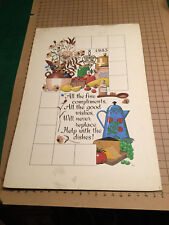 On eBay Now...
On eBay Now...SIGNED R&B SINGER PHOTO CLARENCE "FROGMAN" HENRY 8X10 AUTOGRAPH For Sale

When you click on links to various merchants on this site and make a purchase, this can result in this site earning a commission. Affiliate programs and affiliations include, but are not limited to, the eBay Partner Network.
SIGNED R&B SINGER PHOTO CLARENCE "FROGMAN" HENRY 8X10 AUTOGRAPH:
$212.33
AN 8X10 INCH SIGNED 8X10 INCH PHOTO BYClarence Henry II, known as Clarence "Frogman" Henry, is an American rhythm and blues singer and pianist, best known for his hits "Ain't Got No Home" and " But I Do".Clarence "Frogman" Henry:An R&B Legend!Clarence 'Frogman' Henry is a performer with impressive longevity, taking him from New Orleans to worldwide popularity via chart hits and movie soundtracks. The warm, happy sounds he created have spanned the generations winning new fans and retaining the original ones. As told to me in telephone conversations and a recent meeting in New York, this is his story.Early days inNew Orleans:"By 1956 - I hadmy own band"
Clarence was born in New Orleans on March 19, 1937. His family moved to Algiers, in West New Orleans, in 1948 when the rents went up. Coming from a large family - 4 sisters and 1 brother - he himself has 10 children, 17 grandchildren and 15 great-grandchildren. "My daddy played all kinds of string instruments, and the harmonica and piano - I don't care what, my daddy played it. My mamma kept us in the church, so we had to go to Sunday School."
Locally Clarence listened to R&B singer-pianist Fats Domino and Professor Longhair. "When I was 8 years old I asked my mama to send me to piano lessons because she's sent my sister and she didn't like it. So I started going (it was 15 miles away as well!) and learned the fundamentals. My style I taught myself." His mother wanted him to be more than a blues musician and bought him the sheet music for Indian Love Call. Clarence did play the tune for her, "but when she would go to work, I would play the boogie-woogie!"
At high school in Algiers he became well-known for his renditions of Fats Domino and Professor Longhair material, so his music teacher, William Houston, put a band of high school kids with Bobby Mitchell (of I'm Gonna Be A Wheel Someday fame) and Clarence played as a member of the Toppers for about three years. "I was playing piano and trombone and Steve Gabriel and I alternated; he'd play trumpet and I'd play piano, then I'd play trombone and he'd play piano."
Clarence graduated from high school in 1955. "By 1956 when I recorded Ain't Got No Home I had my own band. [Previously] I [had been] working for Eddie Smith, in his band."
The 'Frogman' arrives:"I used to imitate the frog in school,to scare the girls!"As to how Clarence had moved on from Bobby Mitchell, it turned out that Bobby had sacked him for not turning up on his wedding night: "I had to get married so he got rid of me! Warren Payne and Benny Cummins came down to get me to play at the 'Fat Man' [club] ... $5 a night, 4 hours ... I went to 'Bill's Chicken Shack' and made $7 a night, left there and went to the 'Old Joy' Lounge ... did about 4 nights making about $54 a week."
And his signing with Chess Records? "I was working at a service station in New Orleans and when I got off work I would pass a club called the 'Brass Rail' where Paul Gayten played. I admired him playing, I'd stand n the sidewalk lookin' inside the club. Paul was the A&R man for Leonard Chess and [eventually] I would relieve Paul on Monday at the 'Brass Rail'. I started singin' a song called Ain't Got No Home in the 'Old Joy' Lounge in Gretna. I played it for Paul and Paul sent it up to Leonard Chess, and Leonard Chess came down to hear it.
'When [Leonard] heard it he told Paul to break it up into different parts with the girl and the frog. I had written Lonely Tramp before Ain't Got No Home." On stage Clarence had been doing both the girl and frog parts: "what happened, Shirley and Lee were from New Orleans and were hot during that time. I didn't have a female singer in the band, so I had to switch my voice like a girl." To Clarence the voices came naturally: "but how I do the frog I don't know. On the West Bank, Algiers, you had the alligators and frogs and I used to imitate the frog in school, to scare the girls!"
The 'Frogman' description came from Ain't Got No Home. "Leonard Chess put my record in the 'garbage', [he wanted] to keep it in mind, but I wouldn't be the artist. It was 'make it or break it', that's what they called it. A disc jockey called Poppa Stoppa here in New Orleans was pushin' Troubles Troubles for the A-side and he flipped it over to Ain't Got No Home and the people was crazy over it. They didn't know the title of the song or who was singin' it so they said - "Play the Frog song by the 'Frogman'." "I happened to be in the studio and he said, "From now on your name is 'Frogman'"."
The record's success brought 'live' shows and tours, the first stop in 1957 being New York: "the first place I went to play was the Apollo Theatre (in New York). That was a great experience for me ... [appearing with] Roy Hamilton, Clyde McPhatter, the Hearbeats, Lewis Lymon. We broke an [audience] record with that show, in 1957, the Jocko [Henderson] Show. Went from there to Washington DC, the Howard [Theatre], Royal {Theatre in Baltimore} and we just toured around for a whole year."
Clarence also worked his way around the States as an individual act: "sometimes we doubled up but it wasn't a big package. I had a six-piece band." Bob Astor, who worked for the Gale Agency, "he was my manager, and then GAC, and Universal, with James Brown." The touring ended in'58 and Clarence mainly played locally apart from going out leading the band behind Chuck Berry in '59: "We were playing clubs, and concerts and theatres. I thought the sun would shine and I'd be doing this for the rest of my life, but in 1958 I had to go back home. The record went down so I started working on Bourbon Street [in New Orleans] ... worked there for 21 years, playing Bourbon Street and going out on the road." The club owners had wanted him exclusively on Bourbon St. but Clarence didn't want to "sign that kinda contract, but I said I will always stick with you."
But I Do:"they really thought it was,a white boy singin'"
Then But I Do happened: "in '60 I recorded But I Do and in '61 it went off. Singin' Ain't Got No Home everybody knew it was Clarence 'Frogman' Henry and when I started singin' But I Do, they really thought it was a white boy singin'. That's why you see on my album, it's got a white guy sittin' on a bench. That's Leonard Chess playin' with the fans, the people - that's how we got that cover. I cut But I Do and Ain't Got No Home in New Orleans, in Cosimo (Matassa)'s studio."
"You Always Hurt The One You Love (which gave the album its title) was a different style. Ain't Got No Home was a novelty tune, and But I Do and them were ballads. Bobby Charles, he was from Abbeville and he was doing most of the writing for me. I loved his style. Bobby wrote songs that appealed to me, I could feel them. I liked Country & Western the way Bobby wrote it. Allen Toussaint changed it into pop music [feel] but Bobby was a great, great writer. I'll never forget him for what he did for my career. I admire him." Clarence himself wrote Oh Why for the album.
Re You Always Hurt The One You Love, back in those days you had to get a follow-up to your hit and I was gonna do I'm A Fool To Care but Joe Barry came out with it. They sent me a dub and I was supposed to record I'm A Fool To Care behind But I Do, but some kinda way, Joe came out with it before I did. So we went to Chicago and Allen Toussaint was the arranger for my session. We were going through a lot of songs and we came up with this Ink Spots song and cut it." In the UK, Lonely Street/Why Can't You sold quite well behind You Always Hurt The One You Love. Two such big hits also meant Clarence was suddenly in demand for Dick Clark tours and suchlike. And one or other has been used in lots of movie soundtracks in more recent years, from 'Forrest Gump' to 'Rage Harlem' with lots in between.
Prior to the Chicago session Clarence had recorded in New Orleans, "a lot! Then I did the one in Chicago, one in Memphis [for Argo] and then I went to Nashville and did a session with Boots Randolph and Floyd Cramer for Dial Records, Buddy Killen. In Houston I recorded for Huey Meaux." Bob Astor, Clarence's manager, had set up all those sessions, and was also instrumental in him performing with The Beatles: "he put me with The Beatles - he was with GAC [General Artists Corporation] at the time and he brought them over here. A lotta guys wanted to pay to be with The Beatles but I had the opportunity to play with them I was with the Rolling Stones, Duane Eddy, and on the Dick Clark tours. I met a lot of entertainers in my career. I went overseas you name it, I've been there. I travelled with my family during those times."
Later Years: "six months in England... was the longest I everstayed out on the road"
Bob Astor had also set up the session with Roulette in 1970 for Clarence's 'Alive and Well living in New Orleans' album. The album has some nice material and performances including Cajun Honey and Little Green Frog: "Sam "The Man" Taylor, the saxophone player, wrote that. I had done the "Brooklyn Paramount" with Jackie Wilson, the Shirelles, Jerry Lee Lewis and him. Sam and Bob [Astor] were good friends so he sent the song over to Bob."
Clarence also cut an album in the UK, plus a single for Chas and Dave: "I stayed about six months almost in England. I was with comedians Cannon and Ball for a nine-week season in Scarborough in '83." That aside, Clarence has stayed close to New Orleans: "a lot of New Orleans artists go out [on tour] but they'll come back. I was a family man and the six months in England, that was the longest I ever stayed out on the road." I had seen Clarence in Belfast in the mid-'60s ("I played the North and the South. And in a lot of the pubs we had an opportunity to jam.") and in New Orleans in '66 visited his club on Bourbon Street: "it wasn't mine really but everybody thought it was - I ran it like it was mine, for 21 years, 1959 to 1980."
After the success from But I Do and You Always Hurt The One You Love, "when the bookings went down, I worked on Bourbon St.. A disc jockey on a radio talk show called me [saying] he would use Ain't Got No Home for his homeless show." They even did a video together, plus a cruise, "then everything started happening for me. Over 29 years of royalties I didn't get, I got a lawyer who contacted MCA and they gave me five years of [back] royalties. From then on I started getting royalties."
Now Clarence works special jobs - weddings, private functions, corporate events and suchlike - playing with many of the same musicians over the past 25 years. He has received numerous awards including a 'Living Legend Award' from the Louisiana Hall of Fame on 21 April 2002. Clarence also received a Rhythm & Blues Foundation Pioneer Award in New York in February 2003 and brought the show to a standstill with a great version of Ain't Got No Home.
And next stop? The Rock and Roll Hall of Fame no doubt - that's simply what's due the legendary 'Frogman', Clarence Henry.
PRESS RELEASE
NEW ORLEANS, LOUISIANA - It was a long night evolving into an early morning at the popular nightclub on Huey P. Long Avenue in Gretna and Clarence Henry was getting tired. Besides, he was still a student at LAB, Landry High School, on the West Bank and he needed to get home.
But, he recalled in an interview with the Times-Picayune years later, the crowd would not leave. "I was actually too young to be performing in that place, much less so early in the morning. They just kept dancing and partying and asking for more and more. I gave them every song I knew," he recalled.
"I just looked out at one point, about 2 a.m. or so, and wondered to myself why all these people were still here and why they just don't go home so I could go home and get some sleep," Henry said.
Out of that experience came the Henry classic, Ain't Got No Home, considered one of the historic milestones in the evolution of "New Orleans Rhythm and Blues" into "American Rock and Roll".
A short time later he recorded at Cosimo Matassa's legendary French Quarter studio, the song that has become his worldwide trademark. Not only a classic catchy novelty item, it also showcased Henry's remarkable vocal range and quickly earned him the nickname 'Frogman', the name by which he is known and revered around the globe.
Born in New Orleans in 1937, Henry has musically traveled and conquered the world, but still calls New Orleans home, living for years on the West Bank of the Mississippi River.
The trademark song and a 1955 recording effort, Lonely Tramp, also self penned, quickly propelled Henry into the national spotlight and an appearance at the Apollo Theater in New York in 1957.
It was a rapid rise from a high schooler who had tested his vocal chops a few months before the initial 1955 recording, when he stepped away from playing trombone to handle some vocal chores at a Landry school dance, filling in for the equally legendary and late Bobby Mitchell. Mitchell and Henry and other high school chums had formed a high school band, "The Toppers", which began with Henry in the horn section before doing vocals for an ailing Mitchell. It wasn't long before the two buddies were taking the Algiers ferry together across the river to make records at Manassas' studio.
After the Apollo appearance, Henry, like so many singers of the time, joined many of the various traveling musical caravans and his records quickly made their way to England, where a group of "youngsters" began listening to them and emulating the sounds of American rock and roll.
He scored huge national hits in 1961 with I Don't Know Why, still one of his most requested songs around the world and You Always Hurt The One You Love. The smash success of I Don't Know Why and Ain't Got No Home, landed Henry a spot on the nationally televised "American Bandstand" show hosted by Dick Clark.
By 1964 a group of those British youngsters made a historic debut at Shea Stadium in New York. They called themselves "The Beatles" and had a hit I Wanna Hold Your Hand. They invited one of their U.S. musical heroes, 'Frogman' Henry, to open the Shea Stadium show. He went on to open 18 more Beatles' shows in the U.S. and around the world.
"Being on the same stage and performing with The Beatles was the high light of my life and career. They were all so gracious and kind. I loved them all, but there was a special bond between Paul and me; he was a soul brother", Henry said.
Henry still tours, plays private events and is a much beloved regular each year at the New Orleans Jazz and Heritage Festival.
Henry was inducted into the Louisiana Hall of Fame in 1995 and received the Living Legend Award in 2002. He has also received the New Orleans Big Easy Entertainment award and the Armstrong Cultural Ambassador to New Orleans award.
His trademark song still sells and has sold millions over the years around the world. His recording of But I Do went gold.
Ain't Got No Home took on a somewhat strange new life in the past few years with nationally syndicated radio talk show host Rush Limbaugh, who began playing it every day as a theme to a segment of his show dealing with the homeless Americans.
His music has been featured in numerous movie soundtracks including the hugely popular "Forest Gump" and that soundtrack alone has sold over 8 million copies worldwide. His recorded work is heard in the movies "Diner", "Lost Boys", "Casino", "Raised in Harlem" and "Mickey Blue Eyes". During the filming of "Forest Gump", he spent time in California on the movie set.
On January 25, 2003, Henry was inducted into the Museum of the Gulf Coast Music Hall of Fame in Port Arthur, Texas.
Clarence 'Frogman' Henry, whose Ain't Got No Home is one of the most enduring anthems from the golden age of New Orleans rhythm and blues, received the WWOZ-FM LIVING LEGEND award on February 7, 2003 while in South Carolina on tour.
On February 20, 2003, he was awarded the Pioneer Award from the Rhythm and Blues Foundation in New York.
Clarence 'Frogman' Henry was inducted into the Westbank Music Hall of Fame on October 26, 2003.
Mr. Henry has had the honor and pleasure of entertaining President George Bush, Sr. as well as touring and performing on stage with Tina Turner, Dr. John, Professor Longhair, Jerry Butler, James Brown, Little Richard, Bonnie Rait and many other outstanding artists.
On April 2, 2005, Mr. Henry was inducted in the Delta Music Hall of Fame in Ferriday, LA. Clarence was inducted into the Rockabilly Hall of Fame® on May 9, 2005.
Song HighlightsHighlights All SongsTitle/ComposerAin't Got No HomeClarence "Frogman" HenryBut I Do(I Don't Know Why) But I DoPaul Gayten / Robert GuidryYou Always Hurt the One You LoveDoris Fisher / Allan RobertsLonely StreetI Found a Home(I Don't Know Why I Love You) But I DoA Little Too MuchRobert GuidrySpotifyHummin' a HeartacheClaude Putman Jr.On Bended KneesRobert GuidrySpotifyA Certain GirlNaomi NevilleIn the Jailhouse NowJimmie RodgersSea CruiseHuey "Piano" SmithRock Down in My ShoeBob McRee / Cliff Thomas / Ed ThomasYou've Got a Lot to Learn
He could sing like a girl, and he could sing like a frog. That latter trademark croak, utilized to the max on his 1956 debut smash "Ain't Got No Home," earned good-natured Clarence Henry his nickname and jump-started a rewarding career that endured for over 40 years around the Crescent City.
Naturally, Fats Domino and Professor Longhair were young Clarence Henry's main influences while growing up in the Big Easy. He played piano and trombone with Bobby Mitchell & the Toppers from 1952 to 1955 before catching on with saxist Eddie Smith's band. Henry improvised the basic idea behind "Ain't Got No Home" on the bandstand one morning in the wee hours; when the crowd responded favorably, he honed it into something unique. Paul Gayten (New Orleans A&R man for Chess Records) concurred, hustling Henry into Cosimo Matassa's studio in September of 1956. Local DJ Poppa Stoppa laid the "Frogman" handle on the youngster when he spun the 45 (issued on the Chess subsidiary Argo), and it stuck.
Despite some fine follow-ups -- "It Won't Be Long," "I'm in Love," the inevitable sequel "I Found a Home" -- Frog sank back into the marsh sales-wise until 1960, when Allen Toussaint's updated arrangement melded beautifully with a country-tinged Bobby Charles composition called "(I Don't Know Why) But I Do." Henry's rendition of the tune proved a huge pop smash in early 1961, as did a Domino-tinged "You Always Hurt the One You Love" later that year.
Frogman continued to record a variety of New Orleans-styled old standards and catchy originals for Argo (Chess assembled a Henry album that boasted what may be the worst cover art in the history of rock & roll), even recording at one point with Nashville saxist Boots Randolph and pianist Floyd Cramer. But the hits dried up for good after 1961. Henry opened 18 concerts for the Beatles across the U.S. and Canada in 1964, but his main source of income came from the Bourbon Street strip, where he played for 19 years. You might still find him joyously reviving his classics at the New Orleans Jazz & Heritage Festival -- with his croak remaining as deep and melodious as ever.
Clarence Henry II (born March 19, 1937), known as Clarence "Frogman" Henry, is an American rhythm and blues singer and pianist, best known for his hits "Ain't Got No Home" (1956) and "(I Don't Know Why) But I Do" (1961).[1]Contents1 Career2 Honors3 Covers and re-use of Henry's hits4 Material loss5 Discography5.1 Singles6 References7 External linksCareerClarence Henry was born in New Orleans, Louisiana, United States, in 1937, moving to the Algiers neighborhood in 1948. He started learning piano as a child, with Fats Domino and Professor Longhair being his main influences. When Henry played in talent shows, he dressed like Longhair and wore a wig with braids on both sides. He joined Bobby Mitchell & the Toppers in 1952, playing piano and trombone, before leaving when he graduated in 1955 to join saxophonist Eddie Smith's band.[1][2]
He used his trademark croak to improvise the song "Ain't Got No Home" one night in 1955. Chess Records' A&R man Paul Gayten heard the song, and had Henry record it in Cosimo Matassa's studio in September 1956. Initially promoted by local DJ Poppa Stoppa, the song eventually rose to number 3 on the national R&B chart and number 20 on the US pop chart.[3] The gimmick earned Henry his nickname of 'Frogman' and jump-started a career that endures to this day.[1]
He toured nationally with a six-piece band until 1958, and continued to record.[2] A cover of Bobby Charles' hit "(I Don't Know Why) But I Do", and "You Always Hurt the One You Love", both from 1961, were his other big hits.[4]
Henry opened eighteen concerts for the Beatles across the US and Canada in 1964, but his main source of income came from the Bourbon Street strip in New Orleans, where he played for nineteen years.[1] His name could still draw hordes of tourists long after his hit-making days had ended. He still plays at various conventions, including the New Orleans Jazz & Heritage Festival.
HonorsHenry's pioneering contribution to the genre has been recognized by the Rockabilly Hall of Fame. In April 2007, Henry was honored for his contributions to Louisiana music with induction into the Louisiana Music Hall of Fame.
Covers and re-use of Henry's hitsThe Band recorded a version of Henry's 1956 song "Ain't Got No Home" for their 1973 album Moondog Matinee. It was also used in a famous bathtub scene in the cult movie The Lost Boys with actor Corey Haim singing along to it.
On his 1981 Live/Indian Summer album, Al Stewart introduced his song "Year of the Cat" with an odd anecdote about a mistaken-identity encounter involving Henry, Audrey Hepburn, and G. Gordon Liddy[5]. Henry's original song was later featured on the soundtrack of the 1982 film Diner. Rod Stewart uses the chorus of "Ain't Got No Home" in his 1984 single "Some Guys Have All the Luck". It achieved fresh notoriety in the 1990s through its use as the "Homeless Update" theme music on The Rush Limbaugh Show, and is still used as recently as December 7, 2017.
This song is also in the 1995 movie Casino playing in the background as Joe Pesci asks Robert De Niro for a 50K chip marker. Jimmy Buffett referenced Henry in his song "Saxophones".[6] Henry made a cameo appearance on the third season opening episode of the HBO series Treme.
His 1961 hit, (I Don't Know Why) But I Do, has been covered by Bobby Vinton in 1972 in a pop version. It is also being used in a 2019 commercial for Expedia, showcasing its ability to provide dog-friendly hotel accommodations.[7]
Material lossOn June 25, 2019, The New York Times Magazine listed Clarence "Frogman" Henry among hundreds of artists whose material was reportedly destroyed in the 2008 Universal fire.[8]
DiscographySinglesYear Single (A-side, B-side) Chart PositionsUS Pop[9] USR&B[3] UK[10]1956 "Ain't Got No Home"b/w "Troubles, Troubles" 20 3 -1957 "Lonely Tramp"b/w "I'm A Country Boy" - - -"It Won't Be Long"b/w "I Found A Home" - - -1958 "I'm In Love"b/w "Baby, Baby Please" - - -1961 "(I Don't Know Why) But I Do"b/w "Just My Baby and Me" 4 9 3"You Always Hurt the One You Love"b/w "Little Suzy" 12 11 6"Lonely Street"b/w "Why Can't You" 57 19 42"On Bended Knees"b/w "Standing In The Need Of Love" 64 - -1962 "A Little Too Much"b/w "I Wish I Could Say The Same" 77 - -"Dream Myself A Sweetheart"b/w "Lost Without You" - - -"The Jealous Kind"b/w "Come On and Dance" - - -1963 "It Takes Two To Tango"b/w "If I Didn't Care" - - -1964 "Looking Back"b/w "Long Lost and Worried" - - -"Have You Ever Been Lonely"b/w "Little Green Frog" - - -1965 "You Can't Hide A Tear"b/w "I Told My Pillow" - - -"Tore Up Over You"b/w "I Might As Well" - - -1966 "Ain't Got No Home" (re-recorded version)b/w "Baby Ain't That Love" - - -"Cajun Honey"b/w "Think It Over" - - -1967 "Hummin' A Heartache"b/w "This Time" - - -1968 "That's When I Guessed"b/w "Shake Your Moneymaker" - - -1983 "The Old Piano"b/w "Keep Your Hands Off Her" - - -1993 "(I Don't Know Why) But I Do"b/w "Ain't Got No Home"A-side chart reentry - - 65
Related Items:
Vintage Christmas Decoration Hand Carved Santa 1989 Ole Bob Signed R B Snyder
$59.99
original ART - KITCHEN 1983 -- HELP WITH THE DISHES -- signed R.B.
$149.34
SIGNED R&B SINGER PHOTO CLARENCE "FROGMAN" HENRY 8X10 AUTOGRAPH
$212.33








